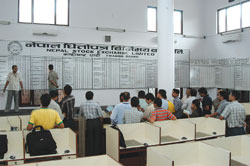|
|
On 11 July, the Nepal Stock Exchange index shot up to 632 points, nearly twice what it was in June (383.83). The main reason is share prices, particularly of banks and finance companies, which are increasing rapidly.
In 2006, the market capitalisation of Rs 20 billion worth of shares was Rs 87 billion. This year capitalisation is just 10 percent higher, but share values have hit Rs 168 billion. For example, Standard Chartered shares valued at Rs 3,800 each a year ago have today hit Rs 5,000.
Most experts say this growth can't last long and that the stresses of the transitional phase will calm things down. Shambu Prasad Panta, assistant manager of NEPSE, has a gloomier outlook. He says the rush to invest in shares has been in the hope of a November election. A postponement would push NEPSE to the brink of collapse.
 In addition, the financial sector and market insiders are talking of a lot of "new money and new faces" in the share market. One analyst explains that the new faces are entrepreneurs with good credit at banks, manpower companies, and Maoists. The new money is that borrowed on low interest from banks, deposits from manpower companies, or 'donations'.
In addition, the financial sector and market insiders are talking of a lot of "new money and new faces" in the share market. One analyst explains that the new faces are entrepreneurs with good credit at banks, manpower companies, and Maoists. The new money is that borrowed on low interest from banks, deposits from manpower companies, or 'donations'.
In April this year, Nepal Rastra Bank directed every bank and financial institution to increase its paid-up capital within six years. The new requirement is Rs 2 billion for commercial banks, Rs 640 million for development banks, and Rs 200 million for finance companies. To achieve the goal every financial institution has to increase its capital deposit by 20 percent each year.
The Nepali stock market right now seems to be driven almost entirely by rumour and speculation. The currency in the capital market does not correspond to the number of shares. In the Nepali capital market, the number of transactions do not square with the jump in index growth. As of last week, share values increased this year by Rs 27 billion, while actual transactions totalled only Rs 7 billion. Financial analyst Sujeev Shakya says this is a bad sign: "In a healthy, transparent stock market, there should be a parity between the market price and the transactions."



